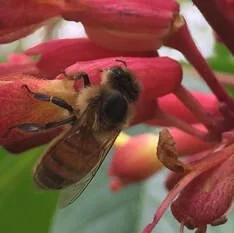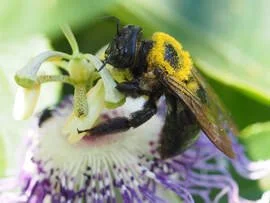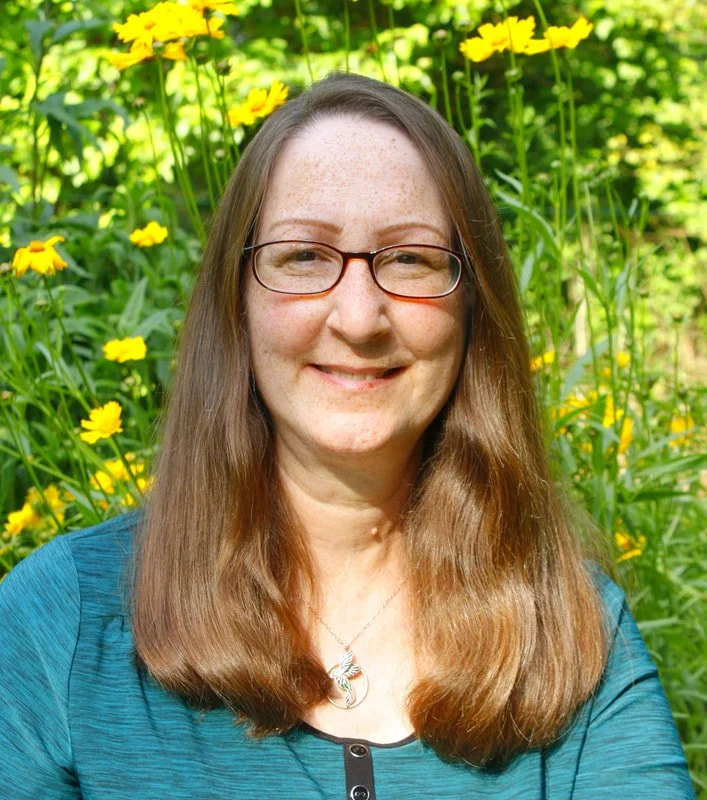For the Love of Bees
Photo by Megan Lee
This June marks Asheville’s 8th annual Pollination Celebration! You’re thinking honeybees, right? How much do most people really know about honeybees? Let’s see…they make delicious honey. Oh yeah, they also pollinate crops. It’s no wonder they’re popular. They’re the poster children of feeding the world.
But they have secrets… Please don’t shoot the messenger. Here goes. They are not originally from the U.S. and compete with native bees for resources. Now understand this isn’t the honeybees’ fault. It’s not as if they decided to fly here with the sole intention of invading our country. They were imported from Europe to Virginia in 1622 to make honey and pollinate crops. When you get right down to it, they’re agricultural animals with the same function as cows or chickens. They feed us.
So, what, pray tell, is wrong with that? Nothing. That is until the crops they pollinate are no longer in flower. That’s when they compete with 4,000+ native species for food. So how do we balance the farmers’ need for crop pollination with that of wild bees? Do we have to choose? Not if we plant enough nectar and pollen producing vegetation for both. Bees use a tremendous amount of energy collecting what they need. The more they find in one area, the less they must travel. This is the same concept as why you go to the closest grocery store.
Photo by Heather Rayburn
Here are suggestions to help you save wild bees and continue to adore honeybees guilt free:
Some wild bees use cavities in wood and hollow stems for nesting sites, so provide bee hotels. You can make your own by drilling several holes ranging from 1 – 25 mm wide by 150 mm long in fallen trees or stacked wood you don’t intend to use. Bees will nest in a size that fits their body, so having a variety will ensure nesting opportunities for several species. When cleaning up your garden or pruning shrubs, leave at least a foot in height of any plants that have pithy stems. Bees will excavate them to nest in.
At least 70% of native bee species nest in the ground. The more nesting opportunities you can provide, the better. Create bare patches of soil here and there for them to excavate. They prefer sandy, well-drained soil with minimal surrounding vegetation (like no traffic areas of your lawn). They may use garden beds if necessary, so don’t use weed barrier fabric. It might as well be concrete to a bee.
Do not use pesticides. They kill insects (bees) through direct contact or from being ingested. Pesticides, including neonicotinoids, are linked to Colony Collapse Disorder. Ask retailers for pesticide-free plants and remove weeds by hand.
Avoid using overhead sprinkler systems. In nature, bees receive warning signals of impending rain and return to their nests for cover. Sprinkler systems provide no warning. When bees return to their nesting site, it is often muddy, landmarks are gone or changed, and nest entrances are obliterated. If bees remain confused about this altered state of their surroundings, they will often abandon the nest with young inside because there’s nothing else they can do. Instead, use sprinklers at night or better yet, install drip irrigation which also conserves water.
If you have a bird bath, keep in mind a bee can drown by landing in water too deep for them to stand in. Add a rock or other surface to it (that’s not clear like water) for them to stand on. You can also provide a shallow dish such as a jar lid. Fill it 3/4 with sand then top off with water. Butterflies will also appreciate this offering.
Plant as many native flowers, shrubs, and trees that bees prefer as you possibly can. This is especially important for beekeepers, as you have a higher concentration of bees that need to forage. Keeping them close to home will allow wild bees to forage elsewhere without as much competition. Asheville GreenWorks provides a comprehensive list of native plants, and nurseries that carry them, on their website.
All native plants and animals have a purpose in their specific environment. They’re interdependent. If Asheville genuinely wants to celebrate its status as the first Bee City USA affiliate in the nation, its residents need to provide for all bee species, not just popular ones.
Let’s all show our industrious little buddies some love by providing what they need!
Mary Summers is an Environmental Consultant with Nature@Home. She reconnects you and your land to nature by showing you how to save time, money, improve aesthetics and increase psychological wellbeing using techniques on your property that have a positive impact on the environment.



